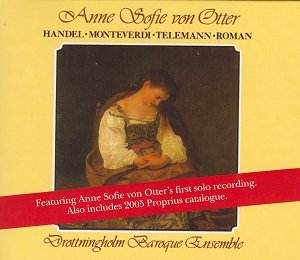These
items are taken from Anne Sofie von Otter’s first solo recording.
We
know and generally love Anne Sofie von Otter for her bright,
highish mezzo, with its lustrous sheen still today virtually
unscratched by twenty years of career. Considering that voices
usually darken and deepen with time, it is interesting to find
her sounding much more like a contralto here than she does today.
This,
I think, is more a question of her chosen style of voice production
at the time. Evidently she was taking baroque-style singing
very seriously, with that slightly nasal sound, often little
different from a high male alto, which has been offered more
recently by, for example, Sara Mingardo. On the whole, I think
Mingardo exerts a greater fascination within her chosen style,
but had Anne Sofie von Otter continued in this way, who knows
what she might have become? All the same, on the whole I am
glad she developed the way she did.
However,
if you leave aside the Anne Sofie von Otter aspect, there is
no doubt that you have here an excellent selection of more and
less well-known baroque music, sung by a musicianly and technically
well-equipped singer thoroughly at home in the style and accompanied
by a delicious-toned ensemble of original instruments. Handel’s
great aria from Giulio Cesare is plangently expressive with
some daringly effective embellishments at the reprise; Monteverdi’s
famous lament from “Arianna” is contrasted with two delightful
little “scherzi”. It is a little odd to hear a female voice
singing “Where’er you walk”, though perhaps less so than having
it sung by a classroom full of boys, which is what some of us
had to do in our early youth. The performance is tenderly restrained.
Turning
to the less well-known pieces, the item from the Swedish composer
Roman’s 1752 Mass is charming, while Telemann’s “Funeral Music
for an Artistic Canary” is a puzzler. In the course of five
movements the canary is mourned in high-flown language, giving
way to a furious condemnation of the cat that did the job, which
is lastly cursed in low German. All set to music with the same
high seriousness that might have been applied to Hercules, Cleopatra,
Ariadne, or any other classical figure. The supposition is that
Telemann wished to parody the apparatus of the classical cantata,
but the point of a parody is that it should gradually become
more and more hilarious by its exaggeration of the more disputable
points of the object of its wit (as in the “play-within-the-play”
in Hamlet). The real thing (in this case a worthy, well-composed
piece somewhat short of Telemann’s best) does not work as a
parody. Bertil Marcusson’s note suggests that the message is
that “We human beings are remarkably similar in our passions”
… There does not “seem to be much of a gap between the grief
and wrath of the owner of the canary and the passionate transports
of Cleopatra”. I did just wonder if there was a third explanation.
Since the piece was discovered in a lumber-room long after Telemann’s
death, is it possible that some merry prankster simply took
a worthy, blameless cantata by this composer, now lost, and
amused himself by fitting crazy words to it?
Excellent
recording, good notes (in English only), texts in the original
languages (without translations).
Christopher
Howell

![]() Anne
Sofie von Otter (mezzo-soprano), Drottingholm Baroque Ensemble
Anne
Sofie von Otter (mezzo-soprano), Drottingholm Baroque Ensemble![]() PROPRIUS PRCD 9008 [46:45]
PROPRIUS PRCD 9008 [46:45] 









